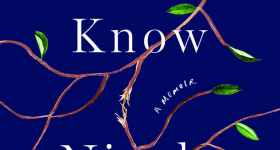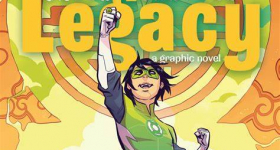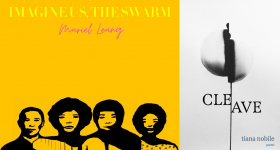***
In fourth grade, I noticed that I only found white girls attractive. I used to watch every last rerun of My Two Dads because I wanted to marry a girl like Nicole. Something was wrong with me. My class was almost two-thirds Chinese by then, and I didn’t think about any of the Chinese girls in the same way I thought about the white ones.
I liked this girl named Courtney. She had blue eyes, freckles and long, wavy auburn hair, and she wore these print maxi dresses that made her look like a seventies love child. I liked her mainly because in addition to finding her cute, she was the one white girl in class who was shorter than me.
Because I liked her, I attacked her mercilessly in four square. One day, after eliminating her yet again with a barrage of corner shots, she pushed me in the chest and shouted, “Why do you keep picking on me?”
We were talking! I was so excited. “I’m sorry,” I said, steeling my jaw. “But I’m trying to make you better.”
“You’re so mean.”
“No, I’m not,” I said. “I like you, and I want to be your friend.”
Courtney lowered her eyes and shook her head. “I’m not going to be friends with you,” she said. “You look like a Lego.”
A Lego! Little, yellow. With C-shaped hands?
“Well, your freckles make you look dirty!” was the best retort I could manage.
Courtney started wailing and ran to the teacher on recess duty. There would be no recess for me for two days.
Now that I’m older, I know the way I saw Courtney and the way she saw me were a result of a malfunctioning in our brains. I put her on this pedestal, and she looked down upon me because of the color of my skin, because of the different ways we dressed, because she was a girl and I a boy. It was all subconscious and it happened before we could do anything about it. Soon, people will look at you in ways that you don’t want to be seen, Maryann. Maybe they’ll wonder “where you’re from.” Maybe they’ll be eyeing your prep-school uniform and thinking about how much money your family has. Maybe they’ll be gawping at your height, your weight, the size and shape of your body parts. Their gaze might make you feel worth less than the next person, unwanted. You might not want to be seen at all — maybe you’ll just want to be free, like the Matt Pohles of the world.
The mindless way we look upon each other is a disease and it has many names. Some call it racism. Or sexism. Or classism. I call it zombie-ism. There’s no cure, no doctors to help, and we all suffer from it from time to time. All you can do is be aware that what a zombie sees isn’t real.
***
As I reached puberty, the Lee women agreed on one thing: something had to be done about my face. Mom hated the way I looked. I was chubby. My hair stuck up from multiple cowlicks. My acne was so bad that my mom got tears in her eyes when she stared at me too long.
She spent the little money we had dragging me to dermatologists, who did painful extractions and made me a lab hamster for Accutane and Retin-A. My mom would often say that no one would want to marry me unless I lost some weight and did a better job of washing my face. (Now that your mom has left me, my mother has resurrected this talking point.)
Grandma distrusted American medicine so she kept flushing my pills down the drain. She preferred to scrub my face with natural products Chinese people could vouch for. Chrysanthemum tea, warm water and ginger and lotus root soup. They fought over me like I was a Middle Eastern oil field. With them buffing my face like a truck, it was a miracle I didn’t reflect sunlight.
My future was the only thing everyone in the Lee Council could bond over. From the time I was in middle school to when I left home, entire dinners were spent debating what I should do when I grew up.
“Once he’s old enough to work at the store, I’ll teach him how to succeed in business,” my dad said. “Een-vess-mun!” That’s how he pronounced the word “investment.”
“Doctor,” Grandma said.
“Lawyer,” Mom said.
Dad slapped the dining table. “C-E-O!” He thrust a finger skyward with each letter.
My grandpa was a quiet man who absorbed, with a sublime and distant grin, every one of my grandma’s insults (“rice bucket,” “deficient brain,” and my personal favorite: “professional airplane hitter” — a euphemism for chronic masturbator). Sometimes he’d just say, “Suffer today so you can have a better future. That’s what we do.” He glared accusingly at Dad and Grandma. “For generations and generations, that’s what we have done.”
***
Dinners were when the adult Lees shared their hands-on love for the family business. They loved port wine. They went through a case a week. By the time I was in junior high, I knew from watching afternoon soaps that people didn’t drink port before dinner, and they certainly didn’t go through a bottle per person in one sitting. My mom was the only member of our family who limited herself to a few sips because she had to drive my dad to his 8:00 pm to 6:00 am shift at Lee’s Liquors. She was usually home and in bed by nine because she had to get up before dawn to work the 6:00 am to 2:00 pm shift before her brother relieved her.
Eventually, I informed her that port was a dessert wine.
“What do you know about wine?” she snapped.
“That’s why it’s sweet.”
“I don’t know who taught you that,” she said. “It’s sweet because it’s good.”
“And you’re only supposed to drink it from a small glass,” I said. “Not giant plastic cups from 7-Eleven like you do.”
My mom was speechless for what seemed like a full minute. “We drink it because it is healthy for adults. Even the whites think so.”
Excerpt from NO GOOD VERY BAD ASIAN by LELAND CHEUK. Copyright 2019 by Leland Cheuk. Excerpted by permission of C&R Press
Author Website: www.lelandcheuk.com
Author Photo: Lisa Kristel
For More Information: www.crpress.org/shop/no-good-very-bad-asian/
Cover Image: Courtesy of C&P Press










Comments